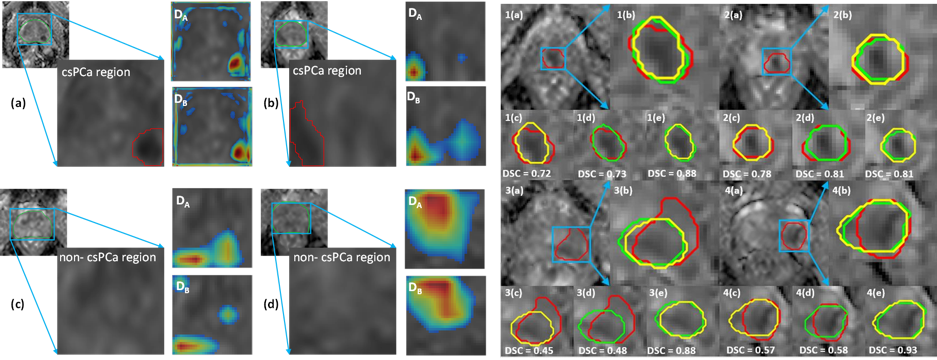In our study, we chose U-Net based deep learning architecture to evaluate test-retest repeatability. We evaluated repeatability for three different tasks (slice- and lesion- level detection of clinically significant prostate cancer, and segmentation of clinically significant prostate cancer regions) and found that the networks were repeatable for slice- level detection of clinically significant prostate cancer and moderately repeatable for lesion- level detection and segmentation of significant prostate cancer regions. We also found that repeatability of network segmentations was in agreement with inter-scan ground truth segmentation repeatability with no systematic bias in the agreement.
The figure below depicts the repeatability of the network in (left) slice- level detection (GradCAM activation maps) and (right) segmentation (ground-truth overlaid segmentation maps) of clinically significant prostate cancer regions.

Written by: Amogh Hiremath, Rakesh Shiradkar, Harri Merisaari, Prateek Prasanna, Otto Ettala, Pekka Taimen, Hannu J Aronen, Peter J Boström, Ivan Jambor, Anant Madabhushi
Department of Biomedical Engineering, Case Western Reserve University, 10900 Euclid Avenue, Cleveland, OH, 44106, USA. ., Department of Biomedical Engineering, Case Western Reserve University, 10900 Euclid Avenue, Cleveland, OH, 44106, USA., Department of Urology, University of Turku and Turku University Hospital, Turku, Finland., Institute of Biomedicine, Department of Pathology, University of Turku and Turku University Hospital, Turku, Finland., Medical Imaging Centre of Southwest Finland, Turku University Hospital, Turku, Finland., Department of Diagnostic Radiology, University of Turku, Turku, Finland.
Read the Abstract


